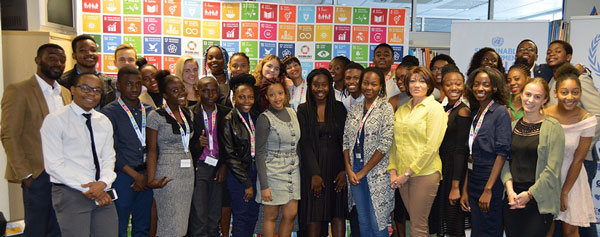
High school students grasp how the UN system works

Twenty-two high school students last week were awarded certificates of participation which included an evaluation of their involvement in the United Nations Information Centre (UNIC) Windhoek’s two week High School Practicum Programme (HSPP).
The programme which was the first its kind worldwide, began in 2016 and is designed for the local children and involves real life experience working in an international development environment and engaging with UN Staff mentors.
Each day of the two-week long programme, the participants learned about the United Nations, its works and the Sustainable Development Goals (SDGs), and their skills were put to the test through educational and interactive practical sessions.
The programme was designed for high school students who have a keen interest in developing their understanding of the works of the United Nations and who want to enhance their potential as agents of change in Namibia.
The 2017 HSPP was an intensive and interactive programme which developed their skills in organizing, mobilizing and recognizing themselves as agents for social change. It engaged the students on various topics such as; amongst others, an understanding of the United Nations and the Sustainable Development Goals.
The participants learned about the importance of the SDG’s and practical ways in which they can apply them in their daily lives. The programme also covered ‘Technology and Education’, and enlightened the youth on the revolution of technology on our society and future generations.
The Youth Empowerment and Development session of the programme encouraged the youth to take charge of their lives and highlighted the importance of education as a necessary vehicle to guarantee the welfare of the youth through training.
Celebrating the excellence of the participants, UNIC Windhoek’s National Information Officer Ms. Anthea Basson, thanked the students for their participation and commitment to the programme.
“The youth are a creative and dynamic force that lies at the forefront of social change. They are the leaders of tomorrow and the world we are building today. The future depends on their ability to critically evaluate previous ideas; innovate on current methods and effectively advocate for progressive and inclusive policies,” she said.
During the emotionally charged award ceremony the students reflected on the lessons learned throughout the rigorous two weeks and expressed their gratitude for the opportunity to be part of the programme stating that “we will carry the lessons we learned here in our hearts”.
Basson also encouraged the participants to identify an area where they can significantly contribute and take action. She urged the students to continue learning and engage in activities that will better their understandings of the SDG’s and the UN system.










































